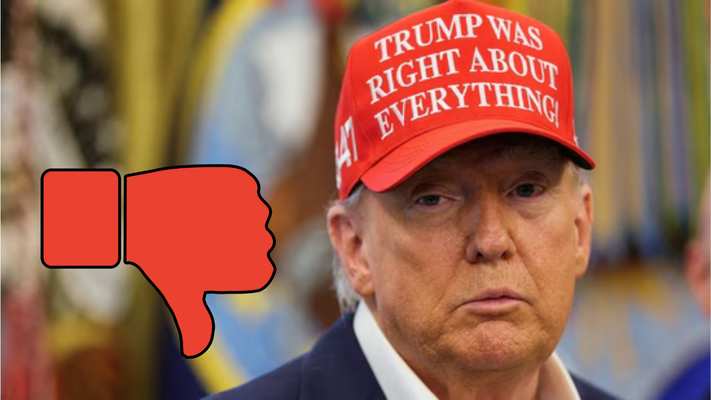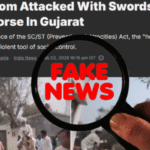US President Donald Trump’s tariff policy, which was recently declared illegal by a US federal appeals court, has been receiving backlash not only from other countries but also from within the US. While Trump’s reciprocal tariffs have been facing criticism from trade experts since the beginning, his act of selectively targeting India with double tariffs has further downgraded his international as well as domestic standing. Several former US officials and economic experts have criticised Trump’s decision to levy stringent tariffs on India and alienate it.
Trump’s tariffs a result of his bitterness for not being allowed to mediate between India and Pakistan
A recently released report by the US multinational investment bank and financial services company, Jeffries, said that Trump’s punitive tariffs on India resulted from the loudmouth US President’s “personal pique” at not being allowed to mediate the India-Pakistan conflict in May this year. The report added that Trump “hoped to intervene” in the military conflict between the two countries that went on for four days. This revelation is a rebuttal of Trump’s claims of having played a key role in mediating a peace deal between India and Pakistan. Trump blatantly kept repeating his false claims despite India’s outright denial of the US involvement in the ceasefire with Pakistan and affirmation that the ceasefire understanding was reached bilaterally.
“Tariffs (on India) are primarily the consequence of the American president’s ‘personal pique’ that he was not allowed to play a role in seeking to end the long-running acrimony between India and Pakistan,” the report stated. “India has never accepted third-party intervention in its relations with Pakistan, and this remains a ‘red line’ despite the economic costs of depriving the 47th American president of one of his opportunities to win the Nobel Peace Prize,” the report added.
American global brand is in the toilet: former US security advisor
Condemning US tariffs on India, former US National Security Advisor (NSA) Jake Sullivan said that the US tariffs on India have damaged America’s global standing and have pushed India towards China. “The American brand globally is in the toilet. Look at India. Trump has executed a massive trade offensive against them. Now, India is thinking, shit, we have to go sit down with China to hedge against America,” Sullivan said without mincing words on The Bulwark Podcast with Tim Miller. He added that the decision has projected the US as “a big disruptor” rather than a reliable partner, while allowing China to gain influence in the region.
Great nations do not give ultimatums all the time: John Kerry
Similar opinions were echoed by former US diplomat John Kerry, who described Trump’s stance against India “as a little bit too much ordering, pressuring, and pushing around”. Taking a jibe at Trump’s popular slogan “Make America Great Again”, Kerry said that great nations “do not necessarily exhibit greatness by giving people ultimatums all the time”.
Trump’s tariffs show a lack of strategic thinking: John Bolton
Earlier, John Bolton, who was the National Security Advisor to the first Trump administration, slammed Trump for his national security and foreign policies and for pushing India closer to Russia and China, setting back the India-US diplomatic ties. Supporting India’s stand on the tariff and Russian oil issue. Bolton described Trump’s decision to impose tariffs on India as a “lack of strategic thinking and priorities”. He added that the decision goes against the US interests.
Trump unsuccessfully trying to armtwist India: Jeffrey Sachs
American Economist Jeffrey Sachs said that with his tariffs, Trump is trying to “armtwist” India without realising the futility of his move and that he would end up isolating the US from the world economy and would make the US industry less competitive. Apart from that, Sachs warned India against the “US friendship”, reminding it how the country has historically used its friendship to serve its own selfish interests, even if it comes at the cost of its “friends”.
Trump’s approval rating sinks
Apparently, the people of the US, whose interests Trump claims to protect with his policies, have also expressed dissatisfaction over his decisions regarding the economy, tariffs, and immigration. Trump’s approval rating, which is an indicator of how Americans view his performance, hit a record low in his second term. In a 5-day survey conducted by Quinnipiac University Poll, 55% of the US voters disapproved of his handling of the job. His net negative 18-point approval rating is his lowest since January 2021. Trump’s approval rating has been on a downward spiral since the beginning of his second term, showing an increasing dissatisfaction among Americans about his policies.
From imposing reciprocal tariffs on its trade partners to baselessly boasting about having mediated global conflicts, Trump’s second term has been full of many decisions, which have projected him as a ‘global bully’ rather than a ‘global peacemaker’, a title he covets to cement his candidacy for the Nobel Peace Prize.
By selectively taxing India for purchasing Russian oil while China continues to be the world’s biggest importer of Russian oil, Trump has undone the decades of diplomatic collaboration between the two countries. The decision has put the India-US trade relations on hold. Trump, who secured favourable trade deals from several countries by misusing his tariffs, hoped that India, like Japan and the European Union, would also give in to his pressure tactics and would agree to trade concessions. However, to the disappointment of Trump, India stood its ground and resisted the US’s trade colonialism. His tariffs reflect his mounting frustration over India’s clear refusal to credit him for the ceasefire with Pakistan, coupled with India’s continued purchase of Russian oil.
While Trump’s trade policy has resulted in a growing anti-US sentiment in India, he is also facing scrutiny in his own country. Trump’s overemphasis on economic priorities and his coercive tactics against India are being viewed by Americans as having an adverse effect on the country’s interests in the Indo-Pacific region. The US has long used India to counterbalance the Chinese influence in the Indo-Pacific region. But his tariff policy has prompted the rekindling of India-China ties and has further strengthened India-Russia relations. This, in turn, has bolstered the BRICS group, to the displeasure of the US President, who has been openly targeting the multilateral forum. Trump threatened to target BRICS “very, very hard” and impose additional 10% tariffs on nations aligning with the group.












